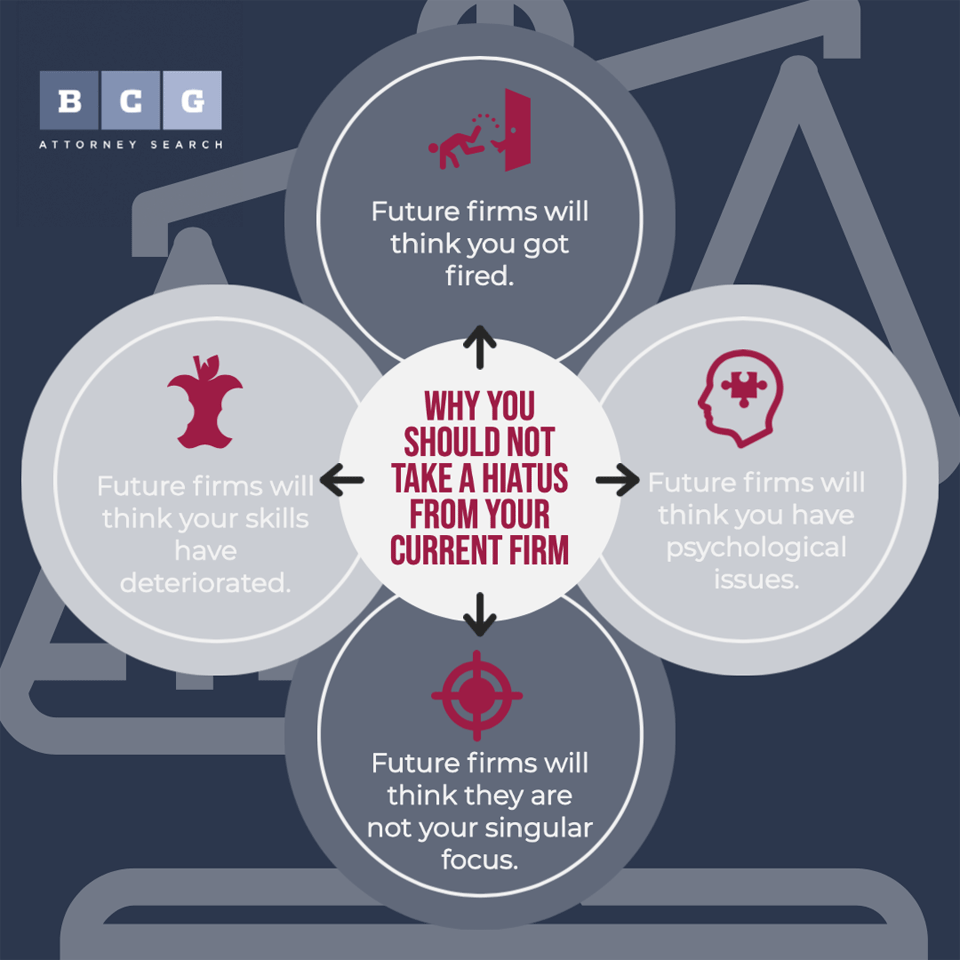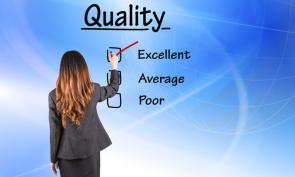- Taking an extended absence from practicing law can have some serious implications for your law career, particularly when searching for a new law firm job.
- In fact, you may not be welcomed back into the practice of law at all.
Summary: This is a must-read article for any attorney who is considering taking an extended leave of absence from the practice of law. This article discusses how firms view extended leaves, the potential ramifications of such leaves on an attorney's career, and the factors firms will use to evaluate whether to hire you when and if you want to return to the legal profession.

Are you an attorney who daydreams about “taking time off” from the practice of law? Do you think you can go somewhere and “decompress” or “get perspective” or simply “take a break” and then come back when you feel like it? More and more, it is becoming common for lawyers to quit their law jobs—often very good and prestigious law jobs—and do things like become ski instructors, travel through the Far East, start bakeries or write novels.

|
|
|
You may not be alone in your musings, but you might be in for a troubled future—financially and otherwise—if you follow your fancy. It may turn out that you have the adventure of a lifetime or fill a hole in your soul, but the downside is (whether or not these good things happen) in all likelihood you will not be welcomed back into the legal profession with open arms when and if you decide to return. The legal profession does not look kindly upon people who take extended breaks, and I discuss the reasons why in this article. Once you have no longer practiced for a major firm for a few months, your odds of getting back in at a high level are severely diminished.

Barring “major life events” such as a helping yourself or a loved one through a serious illness, having a baby or dealing with the death of a family member, you should never leave your law job for more than your allotted vacation time. Absent such extreme justifications, a practicing attorney cannot simply take a hiatus from his or her law practice. Fair or unfair, if you do so you will likely find yourself with no chance of ever coming back into the legal profession, let alone to the kind of prestigious job you left behind.
At the outset, I note that this article is not geared for attorneys who literally feel at the end of their ropes and need to take extended leaves to address basic health, welfare and sanity issues. This article is for those attorneys who simply feel they are entitled to “a break” as payback for all they have given to their firms in sweat, hours and brainpower, or who just feel—whimsically—like doing something else for awhile.
This article discusses the reasons why you should think long and hard before you take an extended leave from your current firm (absent a major life event). It also covers the factors firms will consider when they evaluate your candidacy in the event you try to come back to the practice of law when your hiatus is over.
- Attorneys wondering if stopping altogether is feasible will benefit from reading Should You Quit the Practice of Law? A Comprehensive Exploration.
Middle-Class Values and How They Relate to the “Law Firm Hiatus” Issue
I write a lot about the law as a fundamentally middle-class institution, with middle-class values, and this phenomenon accounts for the major reasons firms look askance at people who go off the rails and take leaves of absences during their legal careers.
Consider that many lawyers lead fairly conventional lives. They have mortgages, car payments and other responsibilities that require them to consistently work hard all their lives. Lawyers support families and are dependent upon paychecks in order to maintain certain lifestyles. Most lawyers do not have the luxury of simply picking up and leaving the profession. When you add paying off student loans—which can exceed $200,000—it is clear that most lawyers are highly leveraged and need to work in order to live the lives they lead. Moreover, it is fundamental to the middle-class experience that people aspire to work harder and go farther than those that came before them. Middle-class people do not rest; they work harder than the rest.
As a consequence, the idea that an attorney would voluntarily choose not to work is something that most other attorneys and law firm managers cannot wrap their heads around. It just does not make sense. That is why, as discussed below, when someone within the legal profession (such as a hiring partner) is confronted with the resume of someone who has gone “off-course” and taken an extended leave, the person looking at the resume will not understand it and will reach for any possible explanation that makes sense. Generally these explanations are not favorable to the leave-taker and involve thinking the leave-taker must have been fired, must have psychological issues, must not be committed to the law or to a middle-class system of values, or must be unskilled and unmotivated to keep up his or her skills.
Deeply embedded in the psyches of most attorneys is the idea that working for others, and especially working hard for others, confers value in the eyes of the world. This is why most attorneys believe that “taking a hiatus” will diminish their value in the eyes of his or her peers and the larger world. Most attorneys simply do not want to be judged poorly by others for voluntarily choosing to take significant time off from the practice of law.
Class-based analysis may make some people uncomfortable, but the fact is that it does exist. I have even argued that the upper-class and lower-class in America are more like each other than either are like the middle-class. This is because the upper- and lower-classes typically do not care what others think about them. The middle class, in contrast, is defined by what others think of them, including what kind of neighborhood they live in and what type of car they drive, whether they went to college, where they went to college, and so forth. Similarly, in the legal profession, lawyers have a tremendous amount of concern for falling within the parameters of what is expected of them. One thing that is decidedly not expected of them is that they will just get up and leave the practice of law. For a more nuanced look at how temporary pauses impact real attorneys’ trajectories, see This Is What Happens to Your Law Career After a Break.
Why You Should Not Take a Hiatus from Your Current Firm
1. Future Firms Will Think You Got Fired.
Chances are, sooner or later, you will get tired of your hiatus and wish to return to a normal job with a stable paycheck that offers you all the respectability and perks of a middle-class life. But if you have a big gap on your resume, law firms will think you got fired from your last firm or were asked to leave and they will pass you over with barely a second look. Law firms are businesses with important clients to service and an endless parade of qualified applicants to do the work they need doing. Why would they select someone they assume was fired over another attorney with great qualifications and an earnest do-what-it-takes attitude?
2. Future Firms Will Think You Have Psychological Issues.
Along with the “he or she must have gotten fired” line of thinking, potential future employers will think “or maybe he or she has psychological issues.” Either way, you are not going to be viewed in a positive light. From the perspective of a law firm, an attorney would have to have a serious defect (mental or otherwise) to simply throw away all of the promise of a solid place in the legal profession.
3. Future Firms Will Think That Your Law Job and Firm Will Not Be Your All-Consuming Focus.
Lawyers are generally extremely competitive by nature. They compete for everything – from getting into good law schools, to getting good grades, to getting good jobs, to getting good assignments at good jobs, to getting better clients and a bigger share of partnership profits. In order to thrive in such a competitive environment, a lawyer needs to care very much about his or her reputation and rank vis-à-vis competitors. Once someone “drops out of the race,” this shows others that the dropout does not really care about winning anymore and this lack of a competitive edge is considered a detriment by law firms.
If you eliminate yourself from competition—even for a little while—the message you send to others is that the law is not your number-one priority. You do not really care anymore if you win, lose or draw. What kind of client wants a lawyer like that? Law firms may talk about collegial environments, reduced hours, and quality of life issues, but the reality is that every firm expects you to have utter commitment and dedication to the firm and its clients. Firms expect you to win.
4. Future Firms Will Think Your Skills Have Deteriorated.
The legal mind is like an athletic body. It will atrophy and whither away if it is not constantly utilized and challenged. Whatever you are doing during your hiatus, if it is not the same kind of complex legal work you left behind, then it is dulling and not sharpening the mind you need to excel as a lawyer. Even if you cannot appreciate your intellectual deficiencies, those around you will and law firms will no longer feel confident entrusting you with the work of their important clients.
Factors Firms Consider in Evaluating Your Candidacy after You Have Taken an Extended Leave of Absence
1. Does the Firm Accept the Reasons You Have Given for Your Hiatus?
There are “major life event” reasons that firms consider acceptable for taking extended leaves of absence, which have already been discussed. The best reasons for taking such leaves generally involve issues that are beyond an attorney’s immediate control and do not reflect on the day-to-day commitment of the attorney. If you faced such a situation, and took a leave as a result, you should clearly explain the nature and circumstances to any future employers. You will need to address the implicit concerns of the new firm—that you were not fired, that you are of sound mind, that you are committed and that your skills are fresh and up-to-date. If the firm accepts your reasons then you might be in luck and get a pass back into the profession.
2. Will You Likely Be Stable in Your Next Position?
Potential firms also will consider your likely stability. The fact that you left the law for a time indicates instability to potential employers. But if you practiced for a long time and amassed a strong record of consistent achievement prior to your hiatus, you might be able to convince a potential firm that the hiatus was an aberration in an otherwise very stable and promising legal career.
Moreover, you can demonstrate stability in other ways. For example, you can show that you have never changed jobs before and have a track record of staying in positions for long periods of time. You can also show that you have put down roots and invested in stability and a future by showing how you have gotten married, had children and are involved in various professional and nonprofessional groups within your community.
- This video — Why Attorneys Who Take Extended Breaks Risk Losing Their Careers — vividly illustrates what happens when attorneys underestimate the impact of a long pause.
If the firm thinks you will be stable in the future, you might get another chance.
3. What Kind of Experience Do You Have?
Regardless of your reasons for leaving the practice of law, firms will carefully evaluate your experience in the event that it can offer them something special and useful. Despite all the objections that future firms may have to your hiatus, they are still businesses and will base their decisions on the law of supply and demand. For example, firms will more readily overlook an extended leave of absence if your practice area is in high demand at the time you want to return. Similarly, lawyers who cultivated specialized skills prior to leaving will often get a second look.
Additionally, past experience at a large or well-regarded law firm has value when a firm evaluates your resume. Litigators trained at well-regarded trial departments, or structured finance attorneys trained at firms with highly respected finance departments, would be likely to raise the interests of some firms even after extended leaves of absence.
Finally, an attorney who has taken an extended leave from a large New York firm, for example, might get some traction at a smaller firm in the Midwest, where competition is not so heavy and where someone with Big Firm training is highly valued.
4. Do You Have Exceptional Educational Qualifications?
For some lucky post-hiatus attorneys, stellar academic credentials can help pave the way for a job offer. This is especially true if the attorney has top-notch academic qualifications and other plusses such as having significant experience in an in-demand practice area at a well-respected firm.
If you have truly outstanding educational qualifications, firms will be far more likely to look the other way if you took extended time off. Law firms are businesses and are looking to maximize their returns on investments. An attorney with a good record at a top law school is someone the firm can use to market to its clients (and get more business). Moreover, other attorneys at the firm will feel good about the level of educational accomplishment possessed by fellow attorneys, and this helps heighten overall morale. Nevertheless, if the firm is under the impression that you are likely to leave again the firm will be unlikely to hire you regardless of your academic qualifications.
Interestingly, out of all the attorneys we see who take extended, self-imposed hiatuses from the practice of law, a majority of them have some of the absolute best educational qualifications imaginable. It is our opinion that these same attorneys may be under the impression that due to their outstanding educational qualifications they are virtually invincible when it comes to getting a job with an important law firm. This line of thinking is quite arrogant and, quite frankly, wrong. Firms are businesses and everybody in them is expected to play by the rules, including those with spectacular qualifications.
A related point is that success in an academic setting does not necessarily translate into success in a law firm environment. Indeed, some levels of academic success may actually hurt your level of achievement in a law firm. We often see young “best and brightest” attorneys coming out of elite liberal academic institutions—the same law schools that often teach anti-establishment points of view in some matters—getting overshadowed by attorneys from second- and third-tier law schools who may not be as intelligent, but have a single-minded obsession with legal practice and do not share the arrogance that they are somehow above the rules of the law firm world.
Conclusion
Taking a hiatus from the practice of law is a risky proposition. There are many reasons for taking an extended leave of absence that are considered legitimate to a law firm, but those are the exception and not the rule. Before you decide to give notice at your current firm, you need to think through this very carefully. The decision you make could have long-lasting and significant consequences on your career.
About Harrison Barnes
No legal recruiter in the United States has placed more attorneys at top law firms across every practice area than Harrison Barnes. His unmatched expertise, industry connections, and proven placement strategies have made him the most influential legal career advisor for attorneys seeking success in Big Law, elite boutiques, mid-sized firms, small firms, firms in the largest and smallest markets, and in over 350 separate practice areas.
A Reach Unlike Any Other Legal Recruiter
Most legal recruiters focus only on placing attorneys in large markets or specific practice areas, but Harrison places attorneys at all levels, in all practice areas, and in all locations-from the most prestigious firms in New York, Los Angeles, and Washington, D.C., to small and mid-sized firms in rural markets. Every week, he successfully places attorneys not only in high-demand practice areas like corporate and litigation but also in niche and less commonly recruited areas such as:
- Immigration Law
- Workers Compensation
- Insurance
- Family Law
- Trust and Estate
- Municipal law
- And many more...
This breadth of placements is unheard of in the legal recruiting industry and is a testament to his extraordinary ability to connect attorneys with the right firms, regardless of market size or practice area.
Proven Success at All Levels
With over 25 years of experience, Harrison has successfully placed attorneys at over 1,000 law firms, including:
- Top Am Law 100 firms such including Sullivan and Cromwell, and almost every AmLaw 100 and AmLaw 200 law firm.
- Elite boutique firms with specialized practices
- Mid-sized firms looking to expand their practice areas
- Growing firms in small and rural markets
He has also placed hundreds of law firm partners and has worked on firm and practice area mergers, helping law firms strategically grow their teams.
Unmatched Commitment to Attorney Success - The Story of BCG Attorney Search
Harrison Barnes is not just the most effective legal recruiter in the country, he is also the founder of BCG Attorney Search, a recruiting powerhouse that has helped thousands of attorneys transform their careers. His vision for BCG goes beyond just job placement; it is built on a mission to provide attorneys with opportunities they would never have access to otherwise. Unlike traditional recruiting firms, BCG Attorney Search operates as a career partner, not just a placement service. The firm's unparalleled resources, including a team of over 150 employees, enable it to offer customized job searches, direct outreach to firms, and market intelligence that no other legal recruiting service provides. Attorneys working with Harrison and BCG gain access to hidden opportunities, real-time insights on firm hiring trends, and guidance from a team that truly understands the legal market. You can read more about how BCG Attorney Search revolutionizes legal recruiting here: The Story of BCG Attorney Search and What We Do for You.
The Most Trusted Career Advisor for Attorneys
Harrison's legal career insights are the most widely followed in the profession.
- His articles on BCG Search alone are read by over 150,000 attorneys per month, making his guidance the most sought-after in the legal field. Read his latest insights here.
- He has conducted hundreds of hours of career development webinars, available here: Harrison Barnes Webinar Replays.
- His placement success is unmatched-see examples here: Harrison Barnes' Attorney Placements.
- He has created numerous comprehensive career development courses, including BigLaw Breakthrough, designed to help attorneys land positions at elite law firms.
Submit Your Resume to Work with Harrison Barnes
If you are serious about advancing your legal career and want access to the most sought-after law firm opportunities, Harrison Barnes is the most powerful recruiter to have on your side.
Submit your resume today to start working with him: Submit Resume Here
With an unmatched track record of success, a vast team of over 150 dedicated employees, and a reach into every market and practice area, Harrison Barnes is the recruiter who makes career transformations happen and has the talent and resources behind him to make this happen.
A Relentless Commitment to Attorney Success
Unlike most recruiters who work with only a narrow subset of attorneys, Harrison Barnes works with lawyers at all stages of their careers, from junior associates to senior partners, in every practice area imaginable. His placements are not limited to only those with "elite" credentials-he has helped thousands of attorneys, including those who thought it was impossible to move firms, find their next great opportunity.
Harrison's work is backed by a team of over 150 professionals who work around the clock to uncover hidden job opportunities at law firms across the country. His team:
- Finds and creates job openings that aren't publicly listed, giving attorneys access to exclusive opportunities.
- Works closely with candidates to ensure their resumes and applications stand out.
- Provides ongoing guidance and career coaching to help attorneys navigate interviews, negotiations, and transitions successfully.
This level of dedicated support is unmatched in the legal recruiting industry.
A Legal Recruiter Who Changes Lives
Harrison believes that every attorney-no matter their background, law school, or previous experience-has the potential to find success in the right law firm environment. Many attorneys come to him feeling stuck in their careers, underpaid, or unsure of their next steps. Through his unique ability to identify the right opportunities, he helps attorneys transform their careers in ways they never thought possible.
He has worked with:
- Attorneys making below-market salaries who went on to double or triple their earnings at new firms.
- Senior attorneys who believed they were "too experienced" to make a move and found better roles with firms eager for their expertise.
- Attorneys in small or remote markets who assumed they had no options-only to be placed at strong firms they never knew existed.
- Partners looking for a better platform or more autonomy who successfully transitioned to firms where they could grow their practice.
For attorneys who think their options are limited, Harrison Barnes has proven time and time again that opportunities exist-often in places they never expected.
Submit Your Resume Today - Start Your Career Transformation
If you want to explore new career opportunities, Harrison Barnes and BCG Attorney Search are your best resources. Whether you are looking for a BigLaw position, a boutique firm, or a move to a better work environment, Harrison's expertise will help you take control of your future.
Submit Your Resume Here to get started with Harrison Barnes today.
Harrison's reach, experience, and proven results make him the best legal recruiter in the industry. Don't settle for an average recruiter-work with the one who has changed the careers of thousands of attorneys and can do the same for you.
About BCG Attorney Search
BCG Attorney Search matches attorneys and law firms with unparalleled expertise and drive, while achieving results. Known globally for its success in locating and placing attorneys in law firms of all sizes, BCG Attorney Search has placed thousands of attorneys in law firms in thousands of different law firms around the country. Unlike other legal placement firms, BCG Attorney Search brings massive resources of over 150 employees to its placement efforts locating positions and opportunities its competitors simply cannot. Every legal recruiter at BCG Attorney Search is a former successful attorney who attended a top law school, worked in top law firms and brought massive drive and commitment to their work. BCG Attorney Search legal recruiters take your legal career seriously and understand attorneys. For more information, please visit www.BCGSearch.com.
Harrison Barnes does a weekly free webinar with live Q&A for attorneys and law students each Wednesday at 10:00 am PST. You can attend anonymously and ask questions about your career, this article, or any other legal career-related topics. You can sign up for the weekly webinar here: Register on Zoom
Harrison also does a weekly free webinar with live Q&A for law firms, companies, and others who hire attorneys each Wednesday at 10:00 am PST. You can sign up for the weekly webinar here: Register on Zoom
You can browse a list of past webinars here: Webinar Replays
You can also listen to Harrison Barnes Podcasts here: Attorney Career Advice Podcasts
You can also read Harrison Barnes' articles and books here: Harrison's Perspectives
Harrison Barnes is the legal profession's mentor and may be the only person in your legal career who will tell you why you are not reaching your full potential and what you really need to do to grow as an attorney--regardless of how much it hurts. If you prefer truth to stagnation, growth to comfort, and actionable ideas instead of fluffy concepts, you and Harrison will get along just fine. If, however, you want to stay where you are, talk about your past successes, and feel comfortable, Harrison is not for you.
Truly great mentors are like parents, doctors, therapists, spiritual figures, and others because in order to help you they need to expose you to pain and expose your weaknesses. But suppose you act on the advice and pain created by a mentor. In that case, you will become better: a better attorney, better employees, a better boss, know where you are going, and appreciate where you have been--you will hopefully also become a happier and better person. As you learn from Harrison, he hopes he will become your mentor.
To read more career and life advice articles visit Harrison's personal blog.






